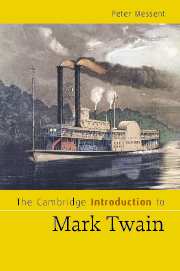2 - Contexts
Published online by Cambridge University Press: 05 June 2012
Summary
Samuel Clemens (Mark Twain) was born on 30 November 1835. The siege of the Alamo began some three months later, on 23 February 1836, with the subsequent declaration of Texan independence from Mexico by American settlers on 2 March. On 25 February 1836, New England inventor Samuel Colt patented the first revolver. At the end of the century, Twain would become a spokesman against American imperialism and a critic of the violence that accompanied it. And in A Connecticut Yankee in King Arthur's Court he would create a protagonist, Hank Morgan, who ‘learned [his] real trade’ at Samuel Colt's ‘great arms factory’ in Hartford, Connecticut: ‘learned to make everything; guns, revolvers, cannon, boilers, engines, all sorts of labor-saving machinery’ (20). Irony would always be a primary tool in Twain's own comic artillery (for humour, as he would explicitly comment, carries its own weaponry) and it sounds strongly in that last phrase.
On the one hand, there seems no connection between Twain's birth and these historical events. On the other, this is one in a number of quirky coincidences and near-coincidences that feature in Twain's life, (unknowingly) predictive of significant concerns and paradoxes in his subsequent career. Twain was, and remains, an iconic figure in the American popular imagination. Yet he conducted an ongoing – if often disguised – quarrel with his country and its dominant value-system.
- Type
- Chapter
- Information
- The Cambridge Introduction to Mark Twain , pp. 11 - 21Publisher: Cambridge University PressPrint publication year: 2007

